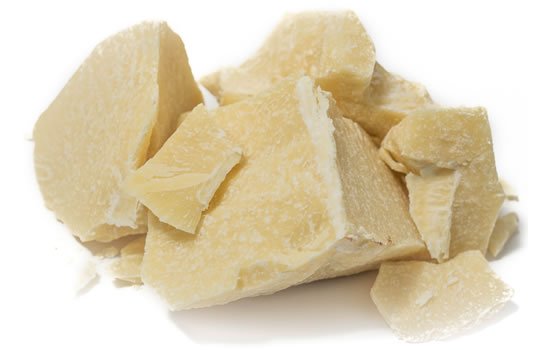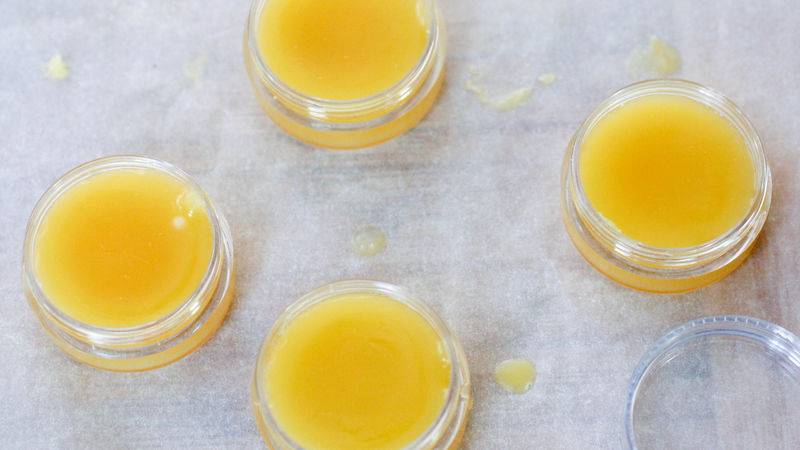Ointments contain fats, usually in the form of wax dissolved in oil, but no water. They sit on the skin without penetrating it, making a watertight protection from infection, as healing and soothing oils are slowly absorbed into the skin.
Heal and soothe
Make your own aromatherapy balms and ointments at home from simple, natural ingredients to ensure that they are specially suited to your needs. Aromatherapy ointments are ideal for minor cuts and grazes if applied after cleaning. They can reduce the chances of infection, especially if antiseptic oils such as tea tree are added. They are also useful for treating insect bites and stings and their waxy consistency protects cracked, dry lips from the elements.
Ointments and balms can also be used on rough, flaky skin on the feet, knees and elbows. Adding geranium or rose oil will soothe and soften the skin if used regularly.
Choosing Carrier Oils and Waxes
Choose pure, unrefined oils and waxes as a base for your ointments and salves.
Beeswax
Produced by the honey bee, beeswax is a truly natural product. It is a water-resistant mixture of fatty acids and esters. Beeswax thickens balms and helps ointment to set. Get in touch with your local bee-keeping association for pure yellow beeswax or purchase from a hardware or health food shop.
Cocoa Butter
Obtained by roasting the seeds of the cocoa bean, cocoa butter has the distinct smell of chocolate. This can either be overpowering or pleasant, depending on your love of chocolate.
It is solid at room temperature but has a low melting point giving a creamy yellow oil rich in saturated fatty acids including stearic, palmitic and oleic acids. An emollient, its concentrated fat content makes it resistant to fungal or bacterial attack, giving it a long shelf life.

Extra virgin olive oil
Choose unrefined organic oil that has been grown and harvested without the use of chemicals. Cold-pressed olive oil is made by simply crushing olives to yield an olive scented, yellowy-green oil that is soothing, nourishing and lubricating.
Herb infused oils
Fresh herbs are soaked in a cold-pressed olive oil for several weeks, so that they release their healing active ingredients into the oil. Herb infused oils can be used to replace olive oil in ointment recipes. Marigold or St John's Wort flowers make wonderfully soothing herb oils that complement the action of essential oils.
Petroleum jelly
This semi-solid lubricant is derived and refined from mineral oil. Petroleum jelly is impenetrable to water, making it an effective waterproof barrier for damaged skin. It is a thick and greasy carrier and a little drop of it will go a long way.
Your Beeswax Ointment Recipe
Place 10g or grated or finely chopped beeswax and 100ml of unrefined olive oil in a heat-proof ceramic dish.
Stand the basin in a large pan of water. Gently bring the water to the boil and simmer, stirring the mixture occasionally until the beeswax has melted.
Allow the mixture to cool, but not to set, before adding 8-10 drops of essential oil, mixing it thoroughly. Caution, beware of hot water, make sure it has cooled adequately before handling.
Pour into small, dark sterilised glass jars and allow to set before capping. Date and label and store in a cool, dark place.

- Olive oil infused with St John's Wort or calendula flowers has added therapeutic benefits.
- To make smaller or larger batches, simply work on a 1:10 ratio of wax to oil
- Wheatgerm and sweet almond oil can be used as alternative to olive oil.
Making a Simple Lip Balm
Lip balms are easy to make at home and you can also add your favourite essential oils to give them a fragrance that appeals to you more personally than a shop bought version.
Melt 1g of cocoa butter and 8g shea butter in a basin and heat in a pan of hot water.
Add 7 drops of healing essential oils such as mandarin or geranium and pour into jars to set.

Create a protective lip balm in a hurry by adding 1-2 drops of essential oil to petroleum jelly and blend thoroughly.
Marigold Ointment
Melt 20g of pure petroleum jelly in a bowl in a pan of boiling water. Once melted, add 20g freshly collected marigold petals and simmer for 10 minutes. Add 5-6 drops of essential oil, cool and bottle.
Best Oils to Use
Chapped Lips
- Chamomile
- Geranium
- Grapefruit
- Myrrh
- Tea tree
Nappy Rash
- Chamomile
- Tea tree
- Yarrow
Insect Bites and Stings
- Basil
- Bergamot
- Chamomile
- Euaclyptus
- Lavender
- Melissa
- Tea tree
- Thyme
Haemorrhoids
- Cedarwood
- Clary sage
- Cypress
- Frankincense
- Geranium
- Rose
Cuts and Grazes
- Benzoin
- Eucalyptus
- Lavender
- Myrrh
- Palmarosa
- Tea tree
- Thyme
1 thought on “Aromatherapy: Making Ointments and Balms”
Comments are closed.